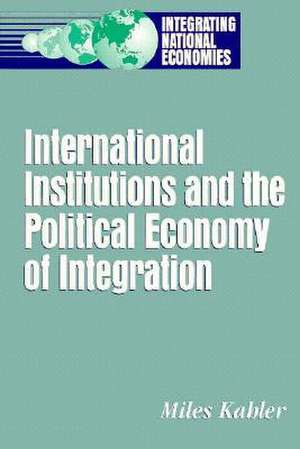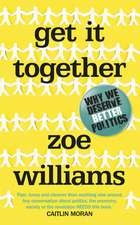International Institutions and the Political Economy of Integration
Autor Miles Kahleren Limba Engleză Paperback – apr 1995
Dynamic changes in international institutions have been a striking feature of international politics in the post-cold war world. The General Agreement on Tariffs and Trade (GATT) has been transformed into the Word Trade Organization, the International Monetary Fund (IMF) and the World Bank have assumed new roles in the transitional economies of Eastern Europe and the former soviet Union, and regional arrangements have proliferated. With deepening economic integration, these institutions play an increasingly important role.
In this book, a part of the Integrating National Economies series, Miles Kahler examines both global and regional institutions and their importance in the world economy. Kahler explains the variation in these institutions and assesses the role they play in sustaining economic cooperation among nations. With greater tensions arising between an economy that is more integrated and a political order that remains highly fragmented, international institutions face many hurdles in supporting policy coordination and harmonization.
The core global institutions—the IMF, World Bank, and GATT—have redesigned their roles in response to the new realties of economic integration. Kahler explains the evolution of these institutions, compares their strengths and weaknesses, and analyzes their efforts to deal with deeper integration. He then considers the array of regional institutions—the European Union, North American Free Trade Agreement, and Asia-Pacific Economic Cooperation—and the tensions they must confront between national desires to maintain political autonomy and, at the same time, benefit form intensified economic exchange.
International institutions confront common dilemmas of widening scope and larger memberships. Kahler concludes that no single institutional model guarantees successful international collaboration. He argues that institutional variety is inevitable and even desirable, and highlights the advantages of flexible institutions. Rapid international economic change, domestic political demands, and the changing boundaries of knowledge reward institutions that are decentralized and respond prompt to the demands of their members. International collaboration may be sustained by institutions that do not display clear, substantive rules or centralized enforcement powers.
A volume of Brookings' Integrating National Economies Series
In this book, a part of the Integrating National Economies series, Miles Kahler examines both global and regional institutions and their importance in the world economy. Kahler explains the variation in these institutions and assesses the role they play in sustaining economic cooperation among nations. With greater tensions arising between an economy that is more integrated and a political order that remains highly fragmented, international institutions face many hurdles in supporting policy coordination and harmonization.
The core global institutions—the IMF, World Bank, and GATT—have redesigned their roles in response to the new realties of economic integration. Kahler explains the evolution of these institutions, compares their strengths and weaknesses, and analyzes their efforts to deal with deeper integration. He then considers the array of regional institutions—the European Union, North American Free Trade Agreement, and Asia-Pacific Economic Cooperation—and the tensions they must confront between national desires to maintain political autonomy and, at the same time, benefit form intensified economic exchange.
International institutions confront common dilemmas of widening scope and larger memberships. Kahler concludes that no single institutional model guarantees successful international collaboration. He argues that institutional variety is inevitable and even desirable, and highlights the advantages of flexible institutions. Rapid international economic change, domestic political demands, and the changing boundaries of knowledge reward institutions that are decentralized and respond prompt to the demands of their members. International collaboration may be sustained by institutions that do not display clear, substantive rules or centralized enforcement powers.
A volume of Brookings' Integrating National Economies Series
Preț: 181.09 lei
Nou
Puncte Express: 272
Preț estimativ în valută:
34.65€ • 35.98$ • 28.90£
34.65€ • 35.98$ • 28.90£
Carte tipărită la comandă
Livrare economică 22 martie-05 aprilie
Preluare comenzi: 021 569.72.76
Specificații
ISBN-13: 9780815748212
ISBN-10: 0815748213
Pagini: 194
Dimensiuni: 152 x 229 x 14 mm
Greutate: 0.27 kg
Ediția:New.
Editura: Brookings Institution Press
Colecția Brookings Institution Press
ISBN-10: 0815748213
Pagini: 194
Dimensiuni: 152 x 229 x 14 mm
Greutate: 0.27 kg
Ediția:New.
Editura: Brookings Institution Press
Colecția Brookings Institution Press
Notă biografică
Miles Kahler is senior fellow at the Council on Foreign Relations and professor of international relations at the Graduate School of International Relations and Pacific Studies at the University of California, San Diego.
Descriere
Dynamic changes in international institutions have been a striking feature of international politics in the post-cold war world. The General Agreement on Tariffs and Trade (GATT) has been transformed into the Word Trade Organization, the International Monetary Fund (IMF) and the World Bank have assumed new roles in the transitional economies of Eastern Europe and the former soviet Union, and regional arrangements have proliferated. With deepening economic integration, these institutions play an increasingly important role.
In this book, a part of the Integrating National Economies series, Miles Kahler examines both global and regional institutions and their importance in the world economy. Kahler explains the variation in these institutions and assesses the role they play in sustaining economic cooperation among nations. With greater tensions arising between an economy that is more integrated and a political order that remains highly fragmented, international institutions face many hurdles in supporting policy coordination and harmonization.
The core global institutions—the IMF, World Bank, and GATT—have redesigned their roles in response to the new realties of economic integration. Kahler explains the evolution of these institutions, compares their strengths and weaknesses, and analyzes their efforts to deal with deeper integration. He then considers the array of regional institutions—the European Union, North American Free Trade Agreement, and Asia-Pacific Economic Cooperation—and the tensions they must confront between national desires to maintain political autonomy and, at the same time, benefit form intensified economic exchange.
International institutions confront common dilemmas of widening scope and larger memberships. Kahler concludes that no single institutional model guarantees successful international collaboration. He argues that institutional variety is inevitable and even desirable, and highlights the advantages of flexible i
In this book, a part of the Integrating National Economies series, Miles Kahler examines both global and regional institutions and their importance in the world economy. Kahler explains the variation in these institutions and assesses the role they play in sustaining economic cooperation among nations. With greater tensions arising between an economy that is more integrated and a political order that remains highly fragmented, international institutions face many hurdles in supporting policy coordination and harmonization.
The core global institutions—the IMF, World Bank, and GATT—have redesigned their roles in response to the new realties of economic integration. Kahler explains the evolution of these institutions, compares their strengths and weaknesses, and analyzes their efforts to deal with deeper integration. He then considers the array of regional institutions—the European Union, North American Free Trade Agreement, and Asia-Pacific Economic Cooperation—and the tensions they must confront between national desires to maintain political autonomy and, at the same time, benefit form intensified economic exchange.
International institutions confront common dilemmas of widening scope and larger memberships. Kahler concludes that no single institutional model guarantees successful international collaboration. He argues that institutional variety is inevitable and even desirable, and highlights the advantages of flexible i









